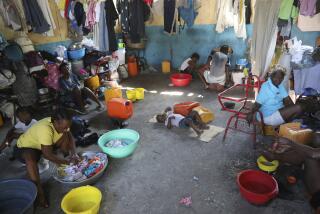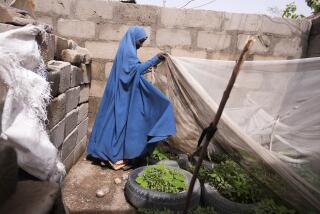For some, stomachs are too empty for AIDS drugs
CANGE, HAITI — AIDS made Marie Lourdes Israel so sick she could barely move her bowed, stick-thin body. The medicine almost killed her.
Her plight wasn’t due to a problem with the drug, but with something more basic: She had no food. Taking the AIDS cocktail on an empty stomach caused severe stomachaches, dizziness and nausea.
“Sometimes I would eat once a day, sometimes not at all because I couldn’t find anything,” said Israel, 51, who lost her meager earnings as a schoolteacher after falling ill to the virus that kills 15,000 Haitians each year.
Starvation and malnutrition are fast becoming the twin perils of the AIDS fight.
Doctors and health experts say millions of infected people in the developing world are rapidly approaching a tipping point where food will replace drugs as the biggest need.
The U.N. World Food Program has launched nutrition programs in Haiti and 50 other countries with the worst HIV rates, providing monthly food supplements for patients and their families.
Without adequate nutrition, AIDS sufferers cannot absorb the drugs needed to slow the virus.
As in Israel’s case, side effects from taking the pills without food can lead patients to neglect treatment.
“When you have the meds and don’t have the food ... then the bigger problem becomes food security,” said Harvard University professor Dr. Paul Farmer, founder of Partners in Health, a pioneering medical mission in Haiti’s highlands that gives free treatment to thousands.
Worldwide, an estimated 3.8 million people with AIDS needed food support this year, possibly rising to 6.4 million by 2008, according to the World Food Program.
Hungry people are six times more likely to die when going on AIDS medication than those with good nutrition, according to a study in the British journal HIV Medicine.
Robin Jackson, chief of the World Food Program’s HIV/AIDS service in Rome, said it was unthinkable to give drugs to a malnourished patient, because “not only will the drug not be very effective, but you’re not going to feel well either” because of severe stomach aches and nausea.
“Would you think in the West we would ever give drugs to someone who was malnourished? No, we don’t do that,” Jackson said.
Many people in Africa and Haiti simply refuse free drugs unless they come with food, leaving little hope for their survival, doctors say.
A recent World Food Program study found that it would cost 66 cents a day to feed an AIDS patient and family, but health experts say that having poured billions into free drug programs, many donors are reluctant to take on the added costs of food supplements.
At a recent AIDS conference in Toronto, Stephen Lewis, special U.N. envoy for HIV/AIDS in Africa, called the lack of funding for food “madness.”
The experts say health workers in the Third World must view food security as being no less important to a person’s health than the right drugs and regular checkups.
Although health professionals don’t want to be food distributors, Farmer said, “We need to be in the business of handing out food.”
The fight against AIDS and malnutrition is evident in Cange, a mountain hamlet in Haiti’s barren Central Plateau and ground zero for the Caribbean country’s struggle with AIDS.
A three-hour drive from the capital along a spine-jarring, rutted road, the town attracts thousands of people who flock to Farmer’s Zanmi Lasante Hospital for free AIDS drugs and, more recently, free food from the World Food Program.
For Israel, months with little food left her weak and so depressed that she could barely get out of bed. Now she has regained the weight and has a healthy glow.
“I have hope because I look completely different from before,” she said, her braided hair tucked beneath a red ball cap.
Others aren’t as lucky.
Dr. Chevrin Francky, one of the ward’s two physicians, said he had lost several patients this year to the food problem and expected to lose more.
“We have the medicine, but many patients don’t have food,” Francky said.
“The biggest problem is poverty.”
More to Read
Sign up for Essential California
The most important California stories and recommendations in your inbox every morning.
You may occasionally receive promotional content from the Los Angeles Times.










